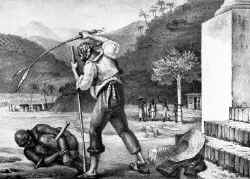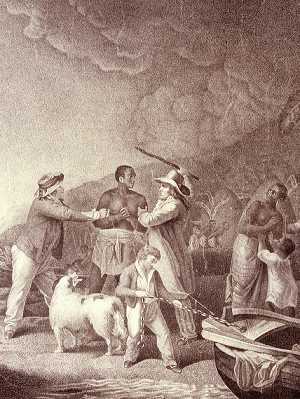| The
proponents of the slave trade lobbied extensively against famous
orators such as William Wilberforce, a prominent abolitionist, to
protect their property and their livelihood. In Parliament, the
supporters of the trade had to defend their position against Wilberforce's
powerful three-hour argument supporting the trade's abolition. (62)
The supporters of the trade argued in their speeches and petitions
that further development of the islands was necessary for the security
of Great Britain, the strength of British manufactures, and the
strength of the navy. (63) They
further asserted that agriculture in the islands could not be carried
on without slave labor. This assertion rang true with the economic
principles of Great Britain. In 1798, the younger William Pitt,
Britain's Prime Minister, estimated that the income derived from
the West Indies was greater than that from the whole of the rest
of the empire including Ireland. (64)
The West Indies were an area of great attention for Parliament and
at the heart of the slavery question. |
|
|
|
|
The
supporters of slavery could not have been more correct about the French
threat to the British islands. The famous abolitionist, James Ramsay,
wrote An Essay on the Treatment and Conversion of African Slaves
in the British Sugar Colonies in 1784. (65)
This essay described the harsh treatment of British slaves in the
colonies. He asserted that the French gave their negroes more food,
holidays, religious instruction, private property, and in general,
more humane treatment than did the English. (66)
This discrepancy between the French and British attitudes towards
the institution inclined slaves to favor the French. Unlike the French
planters who lived and worked on the plantations, "the English
planter, if out of debt, must run away to England...where generally
lost to every useful purpose in life, he vies with nobility in extravagance...while
his attorney, and manager, are obliged to overwork, and pinch, his
poor slaves, to keep up, or increase the usual remittances."
(67) The English plantation system,
therefore, presented a perfect environment for tension and conflict.
The slaves, as a result, turned to France. For the good of the cause,
they murdered men, women, or children with equal indifference; and
when hunted down, died with the cry Vive la Republique. (68) |
|


